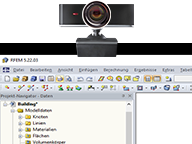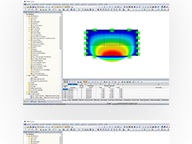Design of Steel Members According to NTC-RCDF 2004 (Mexican Standard)
RF-/STEEL NTC-DF | Features
- Cross-section designs of members and sets of members for tension, compression, bending, shear, torsion, and combined internal forces
- Stability analysis of buckling, torsional, and flexural-torsional buckling
- Automatic determination of critical buckling loads and critical buckling moments for general load applications and support conditions by means of a special FEA program (eigenvalue analysis) integrated in the module
- Alternative analytical calculation of the critical buckling moment for standard situations
- Optional application of discrete lateral supports to continuous members
- Automatic cross-section classification
- Serviceability limit state design (deflection)
- Cross-section optimization
- A wide range of available cross-sections, such as rolled I-sections, channel sections, T-sections, angles, rectangular and circular hollow sections, round bars, symmetrical and asymmetrical, parametric I-, T-, and angle sections, and many others.
- Clearly arranged input and result windows
- Detailed result documentation including references to design equations of the used standard
- Various filter and sorting options of results, including result lists by member, cross-sections, x-location, or by load case, load and result combination
- Result window of member slenderness (optional) and governing internal forces
- Parts list with weight and solid specifications
- Seamless integration in RFEM/RSTAB
Working with RF-/STEEL NTC-DF
First, you have to select the load cases, load combinations, and result combinations to be designed. It is also necessary to enter material, load, and combination data in RFEM/RSTAB in compliance with the design concept specified by the standard NTC-RCDF (2004). The RFEM/RSTAB material library already contains materials relevant for the Mexican and American standards.
Further specifications include presetting of lateral intermediate supports, effective lengths, and other standard-specific design parameters. In the case of continuous members, it is possible to define individual support conditions and eccentricities of each intermediate node of single members. A special FEA tool then determines the critical loads and moments required for the stability analysis in these situations.
In connection with RFEM/RSTAB, it is possible to consider the effect of the general calculation according to the second-order analysis by default. Alternatively, you can create the second-order analysis effects by using enlargement factors.
RF-/STEEL NTC-DF | Output of Results
The first window shows the maximum design ratios including the corresponding design of each designed load case, load combination, or result combination.
The other result windows list all detailed results sorted by specific subject in extendable tree menus. All intermediate results along the members can be displayed at any location. In this way, you can easily retrace how the module has performed the individual designs.
The complete module data are part of the RFEM/RSTAB printout report. You can select the report contents and extent specifically for the individual designs.
Webshop
Customize your individual program package and find out all the prices online!
Calculate Your Price

The price is valid for United States.







.png?mw=192&hash=f63e4a3f1836233005de32f60201d5392e507cf1)



